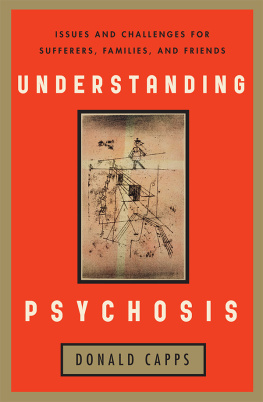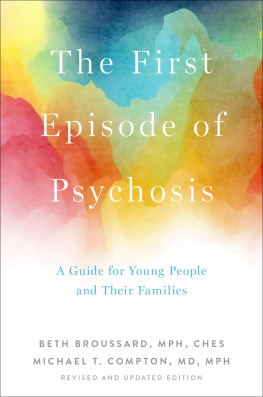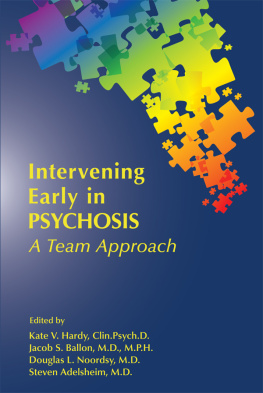Understanding Psychosis
Understanding Psychosis
Issues and Challenges for Sufferers, Families, and Friends
Donald Capps
Rowman & Littlefield
Lanham Boulder New York Toronto Plymouth, UK
Published by Rowman & Littlefield
4501 Forbes Boulevard, Suite 200, Lanham, Maryland 20706
www.rowman.com
Estover Road, Plymouth PL6 7PY, United Kingdom
Copyright 2010 by Rowman & Littlefield Publishers, Inc.
First paperback edition 2014
All rights reserved . No part of this book may be reproduced in any form or by any electronic or mechanical means, including information storage and retrieval systems, without written permission from the publisher, except by a reviewer who may quote passages in a review.
British Library Cataloguing in Publication Information Available
Library of Congress Cataloging-in-Publication Data
The hardback edition of this book was previously cataloged by the Library of Congress as follows:
Capps, Donald.
Understanding psychosis : issues and challenges for sufferers, families, and friends / Donald Capps.
p. cm.
Includes bibliographical references and index.
1. PsychosesPopular works. I. Title.
RC512.C355 2010
616.89dc22
2010018471
ISBN: 978-1-4422-0592-5 (cloth : alk. paper)
ISBN: 978-1-4422-0593-2 (pbk. : alk. paper)
ISBN: 978-1-4422-0594-9 (electronic)
 The paper used in this publication meets the minimum requirements of American National Standard for Information SciencesPermanence of Paper for Printed Library Materials, ANSI/NISO Z39.48-1992.
The paper used in this publication meets the minimum requirements of American National Standard for Information SciencesPermanence of Paper for Printed Library Materials, ANSI/NISO Z39.48-1992.
Printed in the United States of America

Acknowledgments
I am especially indebted to Suzanne I. Staszak-Silva, senior acquisitions editor at the Rowman & Littlefield Publishing Group, for her astute editorial advice, her unfailing encouragement, and the efficient way in which she kept this project on course. As one who appreciates sound advice, steady encouragement, and a minimum of wasted time and effort, I am extremely grateful to her for her role in bringing this book to fruition. I also want to thank Evan Wiig for his gracious responses to my various and sundry queries about technical matters. I am particularly indebted to the production staff at Rowman & Littlefield, especially Alden Perkins, senior production editor, and Nicole McCullough, who copyedited the manuscript. From my vantage point at least, their professional wisdom and concomitant skills made the whole process of turning a manuscript into a book seem almost easy. Finally, I want to express my appreciation to the library staff at Scottish National Gallery of Modern Art, especially Philip Hunt, for their assistance in arranging for the use of Paul Klees The Tightrope Walker on the book cover.
This book is dedicated to John Charles Nash, the son of John Forbes Nash Jr., who, like his father, has been diagnosed with a serious psychotic illness (paranoid schizophrenia) and continues to struggle with its major manifestations (delusions and hallucinations) and personal consequences (including the fact that he has not been able to pursue what would have been a brilliant career in his chosen field of mathematics, in which he holds a Ph.D.). Unlike his father, who was the recipient of a Nobel Prize in Economics for his early work in mathematics, John Charles Nash is unlikely to receive comparable recognition. His life, however, testifies to the personal strengths that persons afflicted with psychotic illnesses rely upon to help them cope with the consequences of their illness and to the vital role that others play, especially, in this case, his parents, in providing the social supports that enable persons afflicted with psychotic illnesses to live in dignity and relative peace.
In an interview conducted in his home by Nancy C. Andreasen, he acknowledged that he continues to experience not only auditory but also visual hallucinations. When queried about what he sees, he was unable or unwilling to respond, and when his mother, who was participating in the interview, asked him whether what he sees are shadows, he rather abruptly stood up, an indication that the interview was over. Although he did not respond to his mothers query, it would not be inappropriate to suggest that, whatever the literal truth, her question had metaphorical value, for persons afflicted with psychotic illnesses may be said to be living in the shadows of the social world that they inhabit and that his rather abrupt termination of the interview was itself a reflection of their shadowy existence due, in part, to the effects of their illness but also to the fact that they and their illness are not well understood by the vast majority of persons who inhabit the same social world.
This book is written, therefore, as an effort, however modest, to bring the seriously mentally ill out of the shadows and into the light so that they might be perceived by others in their full humanity. This dedication of the book to a person who lives a couple of miles or so from where I live, then, reflects a personal desire for the full inclusion of the mentally ill in our communities that I can trace back to my high school years and specifically to a short story published in a scholastic magazine just two years prior to the birth of John Charles Nash and the initial hospitalization of his father, John Forbes Nash Jr.

Introduction
Throughout human history, mental illnesses have been subject to all sorts of misunderstandings. This is especially true of psychotic illnesses. These misconceptions have led to mistreatment and abuse of persons with these mental illnesses. They have been stigmatized, and so have their relatives and friends. This book discusses the importance of understanding psychotic illnesses and their effects on persons who are afflicted with these illnesses. It takes the view that persons afflicted with a psychotic illness do better if those who care about them understand their illness and its effects on their emotions and behaviors. The word understanding has two fundamental meanings. One is comprehension , which involves having knowledge about somethingin this case, psychotic illness. The other is empathy , which involves placing oneself in the other persons situationin this case, the person who has a psychotic illnessand developing the capacity to share this persons emotions, thoughts, or feelings. These two meanings of understanding are intimately connected, for we are more likely to have empathy for a person who has a psychotic illness if we have a good and accurate comprehension of the illness itself. Conversely, one of the ways that we can gain a good and accurate comprehension of the illness is to place ourselves in the situation of the person who has a mental illness and to experience the situation from this persons own point of view.
The purpose of this book is to assist those who care about a person or persons afflicted with a psychotic illness, especially family members and friends, to develop both forms of understanding. Students who anticipate working with mentally ill persons in a professional capacity may also find the book helpful in this regard. One of the best ways to develop both forms of understanding is to focus on specific cases of persons who were or are afflicted with a psychotic illness. Cases enable us to gain an understanding of the illness, of how it manifests itself, of how it changes over time, and its impact on the life of the person who is afflicted with the illness. Cases also aid in our comprehension because they place the individual who is afflicted with a psychotic illness in the context of his or her life. We can focus, for example, on the age of the person when the illness began to manifest itself; the possible role that the persons gender plays in how he or she responds to and copes with the illness; the effects of the illness on other persons, especially family members and friends; and how the responses of these persons are influenced by the social and cultural context in which they and the afflicted person live. Cases also enable us to project ourselves into the situation of a person with a psychotic illness and to share this persons emotions, thoughts, and feelings. In addition, they provide us with the opportunity to discern the degree and extent of our empathy, for some cases are likely to evoke greater empathy than others, and this being so, they invite us to ask ourselves why our emotional responses differ between one case and another.
Next page













 The paper used in this publication meets the minimum requirements of American National Standard for Information SciencesPermanence of Paper for Printed Library Materials, ANSI/NISO Z39.48-1992.
The paper used in this publication meets the minimum requirements of American National Standard for Information SciencesPermanence of Paper for Printed Library Materials, ANSI/NISO Z39.48-1992.
